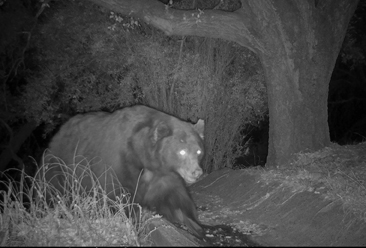
A large bear, nicknamed Ursa Major and caught on a resident’s camera on Nov. 21, has been dining regularly on food in trash cans along Olive Avenue in La Crescenta.
What goes bump in the night? On Olive Avenue, it may be a bear.
Those who live in the foothills know wildlife is simply part of life. Mountain lions, bobcats, coyotes, very active raccoons and hungry bears are just part of the charm of the area. It is a balance for those who live up against wildland areas – a balance that not only requires awareness but a respect for what can be done to allow wildlife to remain wild.
For years a large bear has been roaming the far west end of Olive Avenue in La Crescenta. Recently this bear has ventured to the east of the street and beyond to other areas looking for food – which is aplenty during garbage pickup days.
The Pearson family has a wildlife camera and over time has witnessed many animals explore the area. Susan Pearson’s camera has captured this very large bear on several occasions. Years ago many of the residents at the west end of her street started using “bear cans,” garbage cans that had a purpose of deterring bears or, at the very least, making it difficult for bears to get a free meal.
Pearson said the cans, although not real strong, have helped deter nocturnal visits of the bears but recently the bruins have returned and are moving east as they find it easier to dig food out of non-bear canisters.
Two bears have visited the neighborhood so far this year “affectionately known as Ursa Major and Ursa Minor,” Pearson said.
The smaller “Minor” bear has not been seen recently but Ursa Major has been seen often … and, in fact, when the bear traveled east past the Mattersteig home on Olive Avenue, resident Kim Mattersteig saw him and immediately named him “Mini Cooper” because he was the size of a mini cooper vehicle. Being a community activist Mattersteig knew there was something that had to be done to help deter this bear from visiting foothill neighborhoods. She knew that once wild animals find an easy meal they would no longer hunt in the forest but instead roam the streets looking for food, which can be dangerous for them.
“This past summer we began having a very large bear tear through every trash can he could get into, biting through cans that were designed to prevent access,” Mattersteig said.
She went on a mission to get bear cans for her neighbors.
“On Olive Avenue a lot of the neighbors have bear-resistant cans, but many do not. Other than the recommendation to put trash cans into the garage or pouring ammonia on the cans as a deterrent, bear cans seem to be the final option,” she added.
The waste service for the area – Burrtec – did offer bear cans but at a cost to residents.
“I thought about the pandemic and how families/clients have asked State Farm [Mattersteig is a State Farm agent] to waive our $3 monthly service fee and [the company] said yes. Burrtec charges $9 per month to rent the bear cans,” she said. “I was told the public could not purchase locks to put on the Burrtec cans and [doing so would be] considered vandalism.”
The only cans that could work with the Burrtec system had to be purchased by Burrtec.
Mattersteig reached out to the office of LA County Supervisor Kathryn Barger and to Rebecca Barboza, a biologist with Fish and Wildlife. She was able, with the help of the County, to get Burrtec to waive their fees.
“[Burrtec] will stop charging for bear cans effective Dec. 1,” she said.
LA County and Burrtec will be splitting the charges, a welcomed relief for residents – many of whom are dealing with financial loss during this pandemic.
“A big thank you to Supervisor Barger and her staff,” Mattersteig added.
One neighbor who knows the bear up close is Steve Dowell.
“It was in the middle of the night, about 2 a.m., a couple of months ago. I heard trash cans in the neighbor’s driveway being [knocked] over. They have a motion light and I saw something there.”
There was a fence that separated his home from his neighbor’s so he couldn’t get a clear sight of what was knocking over the garbage cans.
“I finally got enough nerve to just look over the fence,” he said.
A bear was about 10 feet away; he was non-threatening as he looked at Dowell.
“I had my flashlight. The bear looked at me and I looked at the bear,” he said. “[The bear] had emerald eyes and beautiful brown fur. I have seen a number of bears but this is the only one that I was that close to.”
He added he never felt threatened by the bears that have come through his neighborhood.
“[Bears] are smart; as soon as they learn there is a place where they can get food they will [return],” he said.
He does have concerns about the safety of the bears as they make local streets their hunting grounds, going from garbage can to garbage can. He suggested that people not put their garbage cans out the night before trash pickup, and said that cleaning the cans occasionally can help keep bears away as will the bear cans.
“The bears were here first,” Dowell said. “We have to try to live with them.”
Mattersteig also arranged with the County and Fish and Wildlife for a virtual meeting to be “Bear Aware.” It will be held virtually via Webex, hosted by the LA County Board of Supervisors on Dec. 1 at 6 p.m. The meeting number (access code) is 145 198 4185 and the meeting password is Fifth5!.
